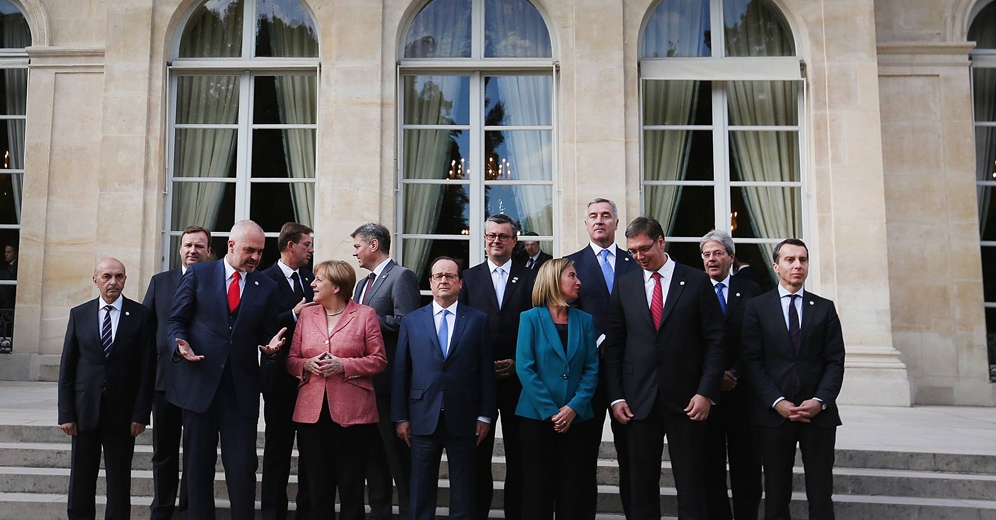
For the third consecutive year, the Heads of States and Governments, Ministers of Foreign Affairs and the Ministers of Economy of Albania, Bosnia and Herzegovina, Kosovo, Macedonia, Montenegro, Serbia as well as Croatia, Slovenia, Austria, Germany, France, Italy, and representatives of the European Union and International Financial Institutions met at the Paris Summit that followed the meetings of Berlin and Vienna.
The Paris meeting took stock of the joint work of the governments in the region, and between the governments and the European Commission in the framework of various regional initiatives promoting regional cooperation and the European perspective of the region.
During the summit, the prime ministers of the region signed the Agreement establishing a Regional Youth Cooperation Office. This office, to be established in Tirana, will fund projects that enhance youth cooperation in the region, as well as opportunities for professional qualifications. Building on the 50-year experience of the Franco-German Youth Office for youth cooperation, the mission of the new office will be to support activities that promote reconciliation of the peoples as well as programmes on remembrance, diversity, intercultural exchange, regional mobility, citizen participation and the promotion of democratic values. All participating States expressed their conviction that the RYCO would provide a major contribution to the reconciliation and the European future of the region by strengthening exchanges and mobility of its youth.
Prime Minister Edi Rama, in responding inter alia to the interest of international media, considered the summit as an encouraging meeting, especially for countries that are on the path of European integration. In an interview for the Albanian media, Prime Minister Rama noted that a new era was opened for the Western Balkans through the Berlin Process: "Of course, this is an overview of the work done together, among governments in the region and governments and the European Commission, with the ever-present support of Germany and of the Chancellor. It was, without any doubt, an encouraging summary in the aftermath of a process that has opened a new era for the Balkans, and in particular for the countries that are on the path to European integration."
As regards connectivity, the participating countries agreed upon a list of 3 new railway projects, which will receive EU co-financing of almost €100 million in addition to financing from the International Financial Institutions and the national budgets of the Western Balkan countries. One of these projects is the one submitted by Albania for the rehabilitation of Tirana-Durres railway, and for the construction of the junction to Rinas airport, with an investment worth 82 million euros, of which the grant of the European Union adopted at the summit amounts to 35 million euros. "One of the three projects to be funded after the Summit is our railway project. We are very pleased that the seriousness shown by the Albanian government in the programming of this phase was highly appreciated. But we are even more happy that our message not to be stopped in the integration process and to move forward had a positive echo, in this case not simply due to a specific merit, but because both the Chancellor and President Hollande were very determined to push forward the integration process of our countries in the European Union", Prime Minister Edi Rama said.
The action plan for removing non-tariff barriers and easing at maximum trade and transport among Western Balkan countries, Albania’s proposal was considered in the summit as an important step for regional cooperation and economic development of the Western Balkans. "On the other hand I am glad that Albania’s proposal and the work done together with other governments, and with the support of the network of the World Bank offices, for an action plan for the removal of non-tariff barriers and the maximum ease of trade and transport among our countries were highly appreciated. It is a plan that we have proposed given the very positive experience between Albania and Kosovo. This plan was immediately embraced by the Serbian government and other governments, and we are preparing to launch it together in September, convinced that it will have a positive impact on increasing mutual trade flows in the region, and obviously also on the economic growth of the countries in the region", Prime Minister Edi Rama said.
At the summit was highlighted the fact that the rule of law lies at the heart of the enlargement process, including reforms in the judicial system, and fighting organized crime and corruption, and ensuring full respect of fundamental rights.
On energy, participants agreed on a road-map for the setting up of a regional market for electricity in the Western Balkans in order to facilitate the exchange of resources, to ensure the better use of existing power systems, integrating renewable energy production, and, eventually, connecting the regional market to that of the EU. The European Commission will follow up on this initiative, with support from the Energy Community secretariat. Progress on the implementation of the road-map will be reflected in future EU funding decisions. The parties welcomed investments in energy efficiency through additional EU funding of € 50 million.
In conclusion, the participating parties welcomed the readiness of Italy to host the next summit on the Western Balkans in 2017.






